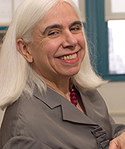Professor Shikha Nangia Named as the Milton and Ann Stevenson Endowed Professor of Biomedical and Chemical Engineering
The College of Engineering and Computer Science (ECS) has announced the appointment of Shikha Nangia as the Milton and Ann Stevenson Endowed Professor of Biomedical and Chemical Engineering. Made possible by a gift from the late Milton and Ann Stevenson,…


 The public lecture, “Why So Slow? The Advancement of Women in the Academy,” will begin at 4 p.m. in Room 105 in the Life Sciences Complex. The event is free and open to the public. Valian will also meet with select, invited groups on campus throughout the day.
The public lecture, “Why So Slow? The Advancement of Women in the Academy,” will begin at 4 p.m. in Room 105 in the Life Sciences Complex. The event is free and open to the public. Valian will also meet with select, invited groups on campus throughout the day.